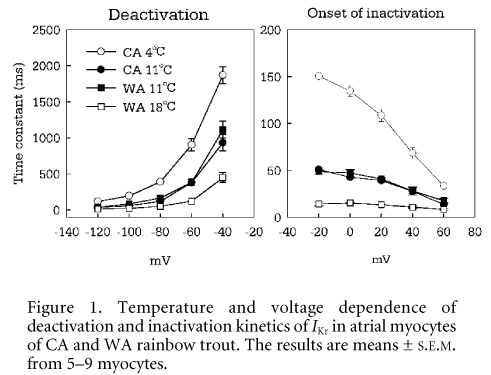Ectothermic animals inhabiting cold environments require physiological compensation mechanisms to maintain a short enough cardiac action potential (AP) duration to allow adequate heart rates and fast contraction kinetics in the cold. To understand the significance of IKr in physiological cold adaptation of the ectothermic heart, the density and kinetics of the E-4031-sensitive (1 mM) current (IKr) was measured in atrial myocytes of rainbow trout (Oncorhynchus mykiss). The fish were reared for a minimum of 4 weeks either at 18 °C (warm-acclimated, WA) or 4 °C (cold-acclimated, CA) and atrial myocytes were isolated by enzymatic digestion. Experiments were conducted at the acclimation temperature of the animals (either 4 or 18 °C) and at 11 °C. All experiments were done with the permission of the local committee for animal experimentation and comply with the current legislation in Finland. The animals were humanely killed at the end of the experiments.
Instantaneous current-voltage relationships of IKr were linear and current densities were 12.7 ± 1.3 (mean ± S.E.M., n = 7; 4 °C) and 13.1 ± 2.9 pA pF-1 (n = 6; 18 °C) (P > 0.05, Student’s unpaired t test) at 0 mV for CA and WA trout, respectively. This indicates an almost perfect thermal compensation of current amplitude. At 11°C, the current density was 28.3 ± 2.7 (n = 7) and 9.2 ± 1.5 pA pF-1 (n = 6) (P < 0.001) for CA and WA trout, respectively, suggesting that the expression of IKr is strongly enhanced by cold adaptation. Deactivation and inactivation kinetics of IKr were strongly temperature dependent and identical for atrial myocytes of CA and WA rainbow trout, suggesting that thermal acclimation does not modify channel gating (Fig. 1). Due to the temperature dependence of current kinetics, acute temperature changes are expected to modify the duration of the AP through changes in IKr.
Voltage-clamp experiments using physiological APs as the command waveform indicated that, due to incomplete deactivation, an accumulation of IKr occurs at physiological pacing rates (30 b.p.m.) in atrial myocytes of the CA trout at 4 °C and generates a strong repolarising current immediately at the onset of the AP. In WA trout at 18 °C, IKr develops more slowly during the AP.
In summary, the present results show that the expression of IKr is regulated in a temperature-dependent manner in atrial myocytes of the trout heart, and that the high density of IKr and the rate-dependent accumulation of IKr in CA fish probably underlie the maintenance of the short duration AP required for adequate cardiac function in a cold environment.
This study was supported by the Academy of Finland (project #53481).
All procedures accord with current National and local guidelines.

